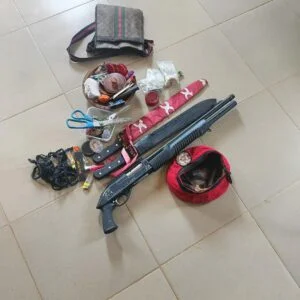Crime
Taliban ban university education for Afghan women

Afghanistan’s Taliban rulers have banned university education for women nationwide, provoking condemnation from the United States and the United Nations over another assault on human rights.
Despite promising a softer rule when they seized power last year, the Taliban have ratcheted up restrictions on all aspects of women’s lives, ignoring international outrage.
“You all are informed to immediately implement the mentioned order of suspending the education of females until further notice,” Minister for Higher Education Neda Mohammad Nadeem said in a letter issued to all government and private universities.
The spokesman for the ministry, Ziaullah Hashimi, who tweeted the letter, confirmed the order in a text message to AFP.
Washington condemned the decision “in the strongest terms.”
“The Taliban cannot expect to be a legitimate member of the international community until they respect the rights of all in Afghanistan. This decision will come with consequences for the Taliban,” Secretary of State Antony Blinken said in a statement.
“No country can thrive when half of its population is held back.”
UN Secretary-General Antonio Guterres was “deeply alarmed” by the ban, his spokesman said Tuesday.
“The secretary-general reiterates that the denial of education not only violates the equal rights of women and girls but will have a devastating impact on the country’s future,” Stephane Dujarric said in a statement.
The ban on higher education comes less than three months after thousands of girls and women sat for university entrance exams across the country, with many aspiring to choose teaching and medicine as future careers.
The universities are currently on winter break and due to reopen in March.
After the takeover of the country by the Taliban, universities were forced to implement new rules including gender-segregated classrooms and entrances, while women were only permitted to be taught by women professors or old men.
Most teenage girls across the country have already been banned from secondary school education, severely limiting university intake.
Journalism student Madina, who wanted only her first name published, struggled to comprehend the weight of Tuesday’s order.
“I have nothing to say. Not only me but all my friends have no words to express our feelings,” the 18-year-old told AFP in Kabul.
“Everyone is thinking about the unknown future ahead of them. They buried our dreams.”
The country was returning to “dark days”, added medicine student Rhea in the capital, who asked that her name be changed.
“When we were hoping to make progress, they are removing us from society,” the 26-year-old said.
– ‘A fundamental human right’ –
The Taliban adheres to an austere version of Islam, with the movement’s supreme leader Hibatullah Akhundzada and his inner circle of Afghan clerics against modern education, especially for girls and women.
But they are at odds with many officials in Kabul and among their rank and file, who had hoped girls would be allowed to continue learning following the takeover.
“There are serious differences in the Taliban ranks on girls’ education, and the latest decision will increase these differences,” a Taliban commander based in northwest Pakistan told AFP on condition of anonymity.
In a cruel U-turn, the Taliban in March blocked girls from returning to secondary schools on the morning they were supposed to reopen.
Several Taliban officials say the secondary education ban is only temporary, but they have also wheeled out a litany of excuses for the closure — from a lack of funds to the time needed to remodel the syllabus along Islamic lines.
Since the ban, many teenage girls have been married off early — often to much older men of their father’s choice.
Several families interviewed by AFP last month said that coupled with economic pressure, the school ban meant that securing their daughters’ future through marriage was better than them sitting idle at home.
– International pressure –
Women have also been pushed out of many government jobs — or are being paid a slashed salary to stay at home. They are also barred from travelling without a male relative and must cover up outside of the home, ideally with a burqa.
In November, they were prohibited from going to parks, funfairs, gyms and public baths.
The international community has made the right to education for all women a sticking point in negotiations over aid and recognition of the Taliban regime.
“The international community has not and will not forget Afghan women and girls,” the UN Security Council said in a statement in September.
However, Pakistan, Afghanistan’s neighbour, said Tuesday that engagement with the Taliban was still the best path forward.
“I’m disappointed by the decision that was taken today,” Foreign Minister Bilawal Bhutto Zardari said on a visit to Washington.
But he said: “I still think the easiest path to our goal — despite having a lot of setbacks when it comes to women’s education and other things — is through Kabul and through the interim government.”
In the 20 years between the Taliban’s two reigns, girls were allowed to go to school and women were able to seek employment in all sectors, though the country remained socially conservative.
The authorities have also returned to public floggings and executions of men and women in recent weeks as they implement an extreme interpretation of Islamic sharia law.
Crime
Police Foil Cult Initiation in Anambra, Arrest Six Suspects

The Anambra State Police Command has foiled a cult initiation ceremony in Nawfia, Njikoka Local Government Area of the state.
Spokesperson for the Command, SP Tochukwu Ikenga, disclosed this in a statement issued on Tuesday in Awka.
According to Ikenga, the operation was carried out by police operatives around 9:30am on June 15, leading to the arrest of six suspects at the scene.
Recovered during the raid were one Jojef pump action gun, two cartridges, and a golden-coloured Lexus SUV with registration number ATN 202 AE. Other items found include two cutlasses, two scissors, a cap bearing the inscription of the Supreme Vikings Confraternity, charms, and substances suspected to be hard drugs.
“They are currently undergoing police interrogation to get more insight into their modus operandi, after which the case will be charged to court on the conclusion of the investigations,” Ikenga stated.
The police spokesperson reassured residents of the command’s unwavering commitment to fighting cultism and other related crimes across the state.
Crime
Court remands 2 over alleged attempted murder

An Ikeja Magistrates’ Court, Lagos, on Wednesday, remanded two persons, Olaitan Fasasi and Kehinde Tobiloba in a correctional facility over alleged attempted murder.
Fasasi, 40, and Tobiloba, 26, whose addresses were not provided, are being charged with conspiracy, attempted murder and membership of a secret society.
The Magistrate, Mr L.A Owolabi, did not take the plea of the defendants for want of jurisdiction.
Owolabi directed the police to forward the case file to the Director of Public Prosecution for legal advice.
He thereafter adjourned the case until May 31 for mention.
The Prosecutor, Josephine Ikhayere, told the court that the defendants committed the offences at about 5.02p.m on Feb. 15, at Mushin, Lagos.
She said that Fasasi, Tobiloba and others now at large, attempted to commit murder by shooting at a resident, Alfred Ademola.
“They armed themselves with a locally made gun. They belong to Eiye Confraternity, a group proscribed by law,”, she said.
Ikhayere said that the offences contravened Sections 230(1) and 411 of the Criminal Law of Lagos State, 2012.
He said that the actions of the defendants also contravened Section 2(3)(a)(b)(c)(d) of the unlawful societies and Cultism Law of Lagos State Law.
Crime
Man jailed 3 months for stealing mobile phone

An Area Court in Jos, on Tuesday, sentenced one Jeptha John, to three months imprisonment for stealing a Redmi mobile phone valued at N165, 000.
The judge, Shawomi Bokkos, sentenced the John after he pleaded guilty to the offence.
The judge, however, gave the convict an option to pay N20, 000 fine and N50, 000 restitution to the complainant.
Bokkos said that if the convict defaulted in paying the restitution, three months should be added to his sentence to make it six months imprisonment.
Earlier, the police prosecutor, Insp Monday Dabit, told the court that the case was reported at the B Division Police Station, Jos, on Dec. 1, 2024, by Ms Nerat Danjuma.
He said that the complainant alleged that the defendant trespassed into her house and stole her mobile phone valued at N165, 000.
The prosecutor further told the court that the offence contravened the Plateau State Penal Code, Law of Northern Nigeria.
-

 Headlines4 years ago
Headlines4 years agoFacebook, Instagram Temporarily Allow Posts on Ukraine War Calling for Violence Against Invading Russians or Putin’s Death
-

 Headlines4 years ago
Headlines4 years agoNigeria, Other West African Countries Facing Worst Food Crisis in 10 Years, Aid Groups Say
-

 Foreign3 years ago
Foreign3 years agoNew York Consulate installs machines for 10-year passport
-

 News1 year ago
News1 year agoZero Trust Architecture in a Remote World: Securing the New Normal
-

 Entertainment3 years ago
Entertainment3 years agoPhyna emerges winner of Big Brother Naija Season 7
-

 Headlines1 year ago
Headlines1 year agoNigeria Customs modernisation project to check extortion of traders
-

 Entertainment2 years ago
Entertainment2 years agoMovie download platform, Netnaija, announces closure
-

 Economy2 years ago
Economy2 years agoWe generated N30.2 bn revenue in three months – Kano NCS Comptroller







